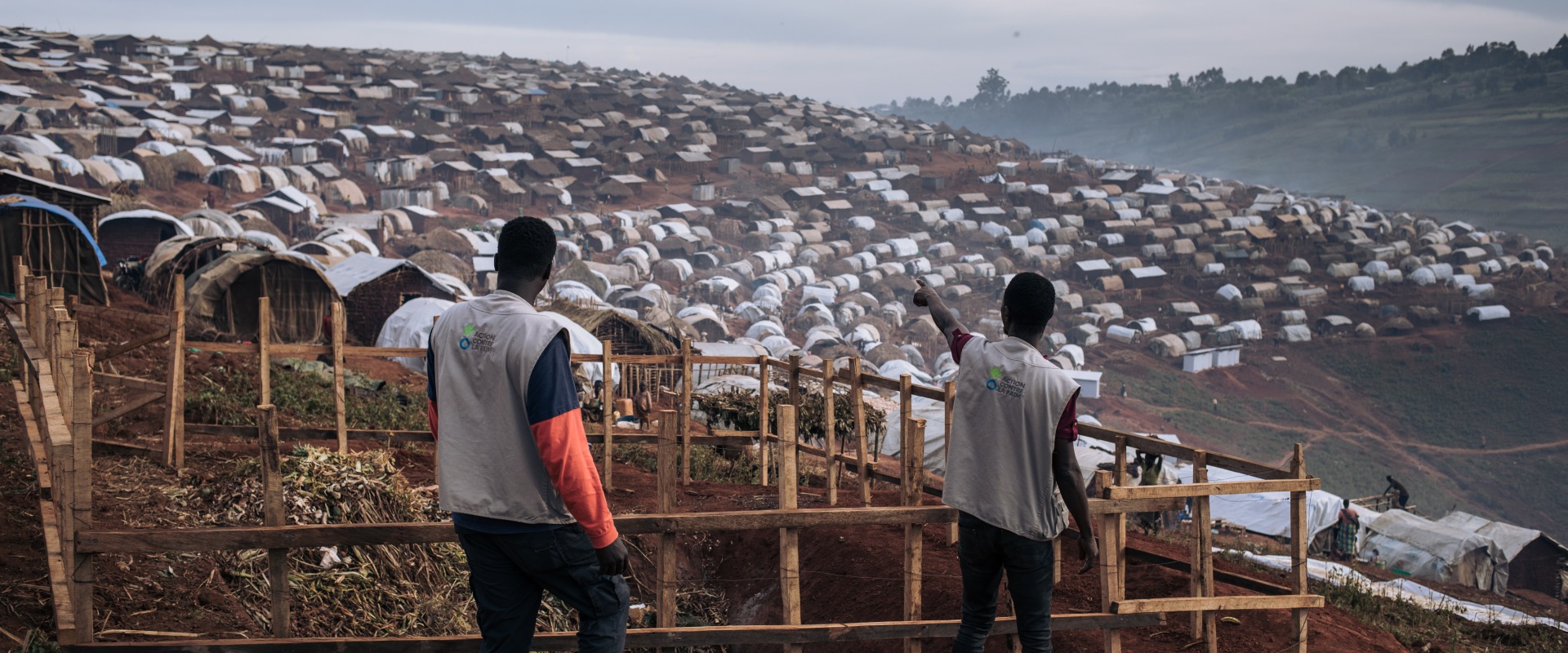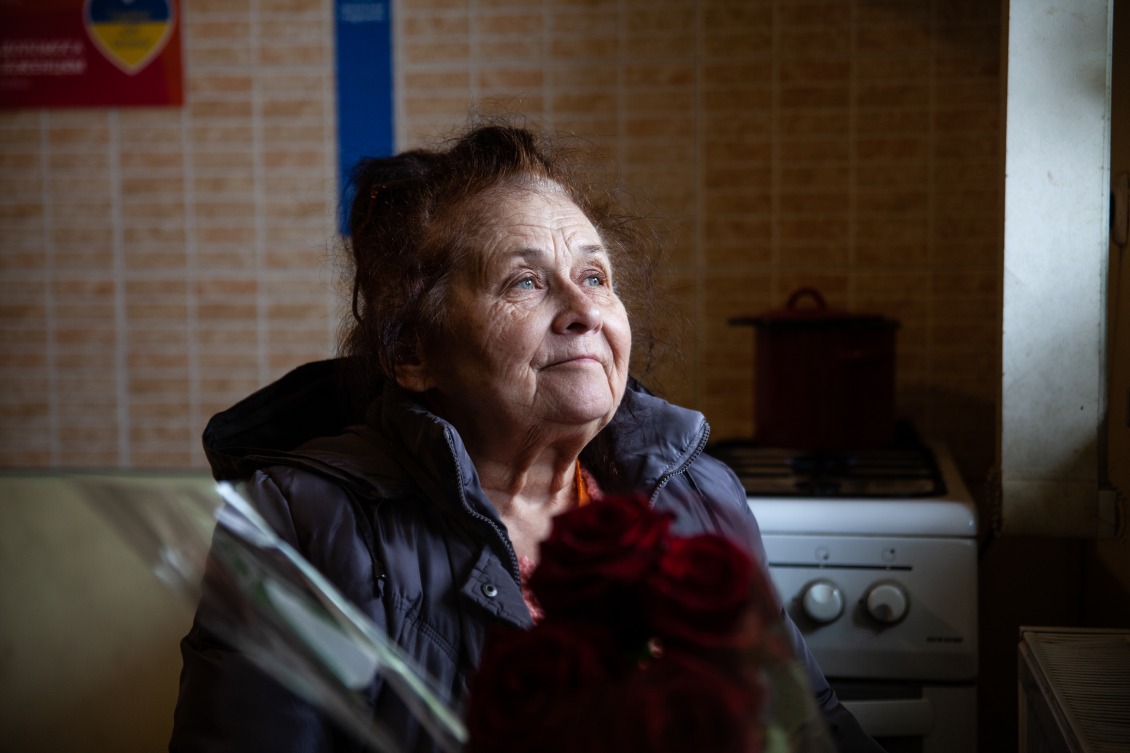
GIVE THIS RAMADAN

Note: This article was written by Action Against Hunger’s CEO, Dr. Charles E. Owubah, and originally published by Fair Planet.
The global refugee crisis is skyrocketing. According to the most recent UN High Commissioner for Refugees’ annual report, the number of refugees worldwide in 2022 stood at a record 108.4 million, up 19.1 million from a year earlier, representing the largest-ever increase.
Half of the world’s refugees are children, like 12-year-old Nyadat Pet. In April, Nyadat was playing with friends in her hometown of Khartoum, Sudan, when conflict broke out. The violence escalated and Nyadat’s family and neighbours were forced to flee the capital. While running for their lives, Nayadat recalls hearing a large bomb. In the smoke and confusion, she and her siblings lost contact with their parents. They lived under a tree for nine days, scavenging for food and trying to survive.
Finally, the siblings were taken in by a caravan of refugees and transported across the border to New Fangak, South Sudan, where they were among the tens of thousands refugees who poured into the neighbouring country.
Millions of refugees face similar, life-threatening challenges every day, experiencing extreme hunger as their harsh reality. In fact, the increase in refugee populations is intricately linked to the rise in global hunger, making these cyclical problems.
In 2022, 70 per cent of the world’s refugee population lived in countries or territories affected by severe food insecurity. Once displaced, these populations not only face severe hunger but barriers to employment, healthcare and food security.
Though each country faces unique circumstances, the need to provide urgent humanitarian assistance to refugee populations is consistent across the globe.
Before violence erupted last April in Sudan, 15.8 million people, or 30 per cent of the population, faced hunger, caused in part by the region’s worst drought in four decades. Today, resources are even more scarce, and food prices have doubled. More than 2,500 people are fleeing every day, and 730,000 are internally displaced.
Even though 600,000 children under the age of five face severe acute malnutrition, more than 50,000 of them have had malnutrition treatment cut short, and are now at risk of pneumonia, acute diarrhea, cholera, malaria and other infections. Neighbouring countries, such as South Sudan, are ill-equipped to receive the refugees.
“Even those who have some money have no access to food,” says Samson Wolderufael, Action Against Hunger’s Nutrition and Health Coordinator in Sudan. “Markets are closed. Banks have collapsed, prices have doubled, movement and roads are unsafe. All of this is affecting the ability of families to access food.”
War, violence, and persecution are the leading causes of the refugee crisis in Ukraine. The continued violence and lack of clear political resolution in the country have led to countless civilian casualties. Millions of Ukrainians are attempting to flee. To date, 11.6 million Ukrainians have been displaced and 17.6 million who have remained in the country are in need of humanitarian assistance.
Action Against Hunger is partnering with local authorities in Poland, Moldova and Romania to provide basic services in refugee transit centers, such as water, food and mental health support. When we can, we also offer financial assistance and contingency planning in case of more refugee influxes.

Elena, a 75-year-old from Cherkasy, lives in a community center in Moldova. She was left unable to return home when the war broke out during her business trip. Moldova is one of the poorest countries in Europe, with 20 per cent of the population living in poverty. She sleeps in a crowded room with other refugee families. Her husband died of Covid-19 before the conflict began, and her daughter is presumed to have been killed during a bombing. She has also lost her business.
Elena is just one of many.
Today, 1 in 3 families in Ukraine face hunger; in some areas of the country, it’s 1 in 2. Our teams are providing cash, meals, hygiene kits, cleaning supplies and other essentials to ensure basic needs are met.
Bangladesh hosts the world’s largest refugee camp, home to hundreds of thousands of Rohingya people, an ethnic minority that fled violent persecution in Myanmar. Climate-induced disasters, including flash flooding, cyclones and erosion, have made farming in the region nearly impossible and displaced most families.
Most men leave their homes in search of work, while women are typically left behind to care for children and vulnerable family members. Sabuda, a Bangladeshi woman living near the Ichamati River, said, “Every year we spend three months with our land underwater. It takes another three months to dry out and get back to everyday life.”
The climate crisis is a hunger catastrophe. Mothers like Sabuda have extremely limited incomes and are forced to make difficult decisions every day to keep their families alive.
“We were deprived of nutritious food, and so we were suffering with health problems,” she said. “We could hardly get rice and salt during the days when we had no work. We could not grow anything in our yard because we did not have any savings.”
We are working with Sabuda and many others, helping them meet basic needs while preparing for the constant threat of climate disasters. We teach climate-smart farming methods so that families can access nutritious food, rebuild livelihoods and afford school for their children.
The global refugee crisis cannot be solved without addressing hunger. Poverty-stricken communities are often the most vulnerable to food insecurity and have the fewest resources to bounce back when disasters, like droughts or floods, hit. No matter the cause of displacement, communities cannot recover if basic needs are not met.
When communities don’t have the means to feed themselves or their children, short-term emergencies escalate into long-term problems, uprooting entire communities from their homes. In providing hunger assistance to communities around the world, we can provide immediate relief to the most vulnerable while also fostering stability, resilience and sustainable development to stem further refugee crises.
Join our community of supporters passionate about ending world hunger.